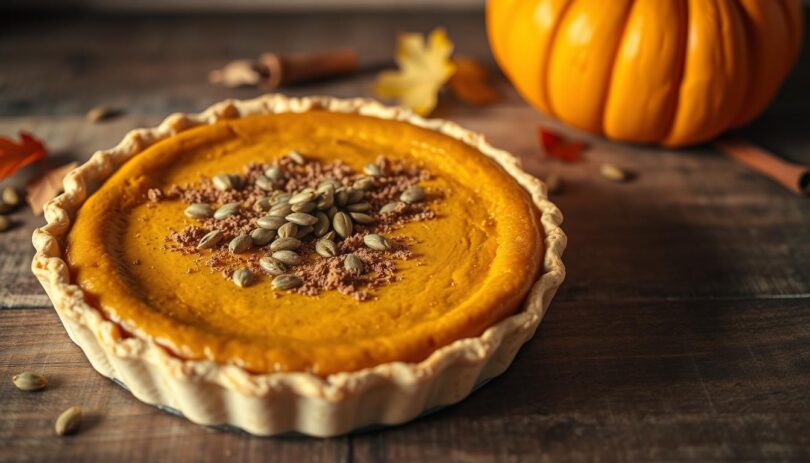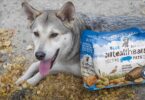Sharing holiday treats with pets often feels like second nature. The warm aroma of spices wafting through the kitchen creates a sense of togetherness—but not every seasonal delight is safe for four-legged companions. This leaves many pet owners wondering: what risks or benefits come with sharing festive desserts?
Plain pumpkin offers valuable nutrients like fiber and vitamin A, which support digestion and immune health. However, the classic holiday dessert often contains additives like nutmeg, cloves, or artificial sweeteners. These ingredients can trigger serious health issues, even in small amounts.
Balancing safety with tradition requires careful consideration. While homemade recipes using pureed pumpkin might seem harmless, store-bought versions frequently include hidden dangers. Pet parents must weigh short-term indulgence against long-term well-being.
This article explores the science behind safe alternatives and harmful additives. Discover how to navigate holiday feasts while prioritizing your companion’s health—because every treat should bring joy, not worry.
Understanding the Risks: Can Dogs Eat Pumpkin Pie Safely?
Holiday desserts often hide unseen dangers for pets. While plain pumpkin offers nutritional value, traditional recipes transform it into a hazardous treat through added spices and sweeteners.
Key Concerns for Holiday Treats
Nutmeg contains myristicin, a compound toxic to animals. Even small amounts may cause elevated heart rates or neurological problems. Many commercial pies also include xylitol—an artificial sweetener linked to blood sugar crashes and liver damage.
Butter and refined sugar create additional risks. These ingredients often lead to pancreatitis or digestive distress. Store-bought varieties frequently combine multiple unsafe components, amplifying health threats.
Toxic Symptoms to Watch For
Early warning signs include vomiting and diarrhea. Severe cases might involve tremors or seizures due to spice toxicity. Persistent lethargy or loss of coordination requires immediate veterinary attention.
Owners should monitor for abdominal discomfort or unusual behavior. Quick action improves outcomes when accidental ingestion occurs. Always consult a professional if exposure to risky ingredients is suspected.
Examining Toxic Ingredients in Pumpkin Pie
Festive desserts bring joy to gatherings, but hidden ingredients can turn them into silent threats for pets. While pumpkin itself is nutritious, the spices and additives in traditional recipes create risks that pet owners must recognize.
Hazardous Spices and Additives
Nutmeg poses one of the gravest dangers. Its compound myristicin can trigger seizures or organ failure in dogs, even at low doses. Cloves and cinnamon, though less toxic, may still irritate sensitive stomachs.
Store-bought versions often amplify risks. Canned pumpkin pie filling typically contains concentrated spice blends and preservatives unsuitable for animals. These ingredients heighten toxicity compared to plain, unsweetened alternatives like homemade pumpkin puree.
Impact of Sugars, Butter, and Artificial Sweeteners
Excessive sugar and butter overload canine digestive systems. They contribute to pancreatitis, obesity, and diabetes over time. Xylitol—a common sugar substitute—is especially deadly, causing rapid blood sugar drops and liver damage.
Even small slices deliver harmful doses. A single serving might contain weeks’ worth of a dog’s recommended fat intake. Always check labels for these additives before sharing holiday foods.
If exposure occurs, contact pet poison control immediately. Symptoms like vomiting or lethargy signal urgent veterinary care. Prioritizing ingredient awareness helps keep celebrations safe for everyone.
The Nutritional Benefits of Plain Pumpkin for Dogs
Plain pumpkin packs a powerhouse of nutrients that support overall wellness in pets. Rich in soluble fiber, it helps regulate digestion by absorbing excess water in the intestines. This makes it effective for addressing both loose stools and mild constipation. Veterinarians often recommend adding a spoonful to meals for pets with sensitive stomachs.
Vitamins A, C, and E in pumpkin contribute to immune function and skin vitality. These antioxidants promote a glossy coat and reduce inflammation. Unlike processed treats, plain pumpkin contains no added sugars or spices, making it a safe supplement for daily diets.
When selecting pumpkin products, opt for 100% pure canned pumpkin—never pie filling. The latter often includes harmful additives like cinnamon or nutmeg. For variety, mix in roasted seeds (rich in magnesium) or a teaspoon of unsweetened peanut butter. Both add texture and protein without compromising safety.
Moderation remains key. Too much fiber can cause bloating, so stick to 1-4 tablespoons per meal based on your pet’s size. Pairing pumpkin with other nutrient-rich vegetables like squash creates balanced, vet-approved meals. Always consult a professional before introducing new foods to ensure they align with your companion’s specific needs.
Safe Alternatives and Feeding Tips for Your Dog
Creating nutritious snacks for pets doesn’t require sacrificing flavor or fun. Simple ingredient swaps and portion control let owners share seasonal favorites without compromising health. Focus on fresh, unprocessed ingredients to craft wholesome rewards.
Homemade Dog-Friendly Pumpkin Treats
Blend plain canned pumpkin with oats and unsweetened peanut butter for a protein-packed dough. Roll into small balls or freeze in silicone molds for cooling summer bites. Another option: spread mashed pumpkin on a lick mat or stuff it into a rubber toy to keep pups engaged.
For a crunchy snack, mix pumpkin puree with whole wheat flour and bake into thin slices. Avoid added sugars or spices—these recipes thrive on simplicity. Rotate flavors by adding shredded carrots or apples for variety.
Portion Guidelines and Preparation Methods
Small breeds should receive no more than 1-2 teaspoons per serving, while larger companions can handle 1-2 tablespoons. Treats shouldn’t exceed 10% of daily food intake. Always introduce new items gradually to monitor digestion.
Use 100% pure pumpkin puree—never pie filling—for recipes. Roast seeds at 350°F for 15 minutes to create fiber-rich toppers for kibble. Store homemade snacks in airtight containers for up to five days, or freeze for longer freshness.
Wrapping Up: Ensuring a Safe and Happy Holiday for Your Furry Friend
Celebrations with pets require thoughtful choices to balance festivity and safety. While traditional desserts pose risks, plain pumpkin offers fiber and vitamins that support digestion and immunity. Always avoid spiced or sweetened versions, as ingredients like nutmeg threaten your companion’s health.
Focus on vet-approved snacks and moderation. Homemade treats using pure pumpkin puree—never pie filling—let pets join the fun safely. Monitor for signs like blood in stool or persistent vomiting, which demand immediate veterinary care. Pet insurance can ease stress if unexpected issues arise.
Stay alert to hidden dangers in holiday spreads. Store desserts securely and educate guests about unsafe foods. Quick action during emergencies prevents minor problems from escalating.
With careful planning, you can create joyful memories without compromising well-being. Here’s to a season filled with wagging tails and peace of mind—because nothing beats seeing your furry friend thrive!
FAQ
Are holiday desserts like pumpkin pie safe for pets?
Many seasonal treats contain ingredients harmful to animals. Nutmeg, a common spice in pumpkin pie, contains myristicin, which may cause seizures or neurological issues. Xylitol, butter, and excess sugar also pose risks like digestive upset or blood sugar spikes.
What symptoms indicate a toxic reaction in dogs?
Vomiting, diarrhea, lethargy, or tremors may signal ingestion of unsafe ingredients. Nutmeg toxicity can lead to disorientation, while xylitol exposure often causes sudden weakness or collapse. Contact a veterinarian immediately if these signs appear.
Can plain pumpkin support a dog’s health?
Unsweetened canned pumpkin (not pie filling) provides fiber to regulate digestion. It’s low in calories and may ease constipation or diarrhea. Always introduce it gradually and consult your vet for portion guidance based on your pet’s size.










Leave a Comment